仁爱九上U3T3SectionC导学案
仁爱版九年级英语U3T3导学案
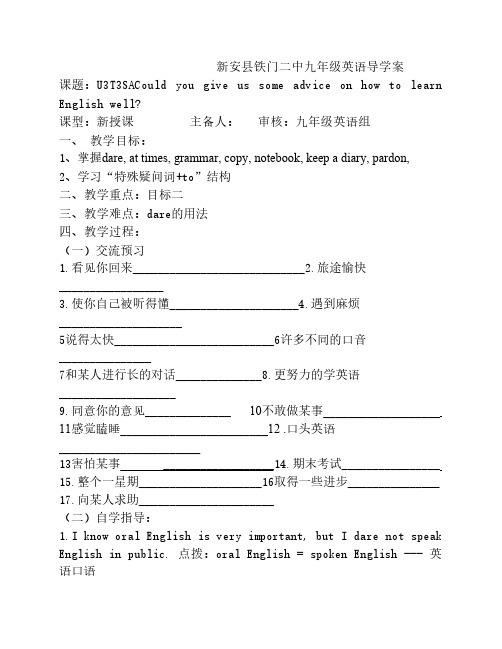
新安县铁门二中九年级英语导学案课题:U3T3SACould you give us some advice on how to learn English well?课型:新授课 主备人: 审核:九年级英语组一、 教学目标:1、掌握dare, at times, grammar, copy, notebook, keep a diary, pardon,2、学习“特殊疑问词+to”结构二、教学重点:目标二三、教学难点:dare的用法四、教学过程:(一)交流预习1.看见你回来____________________________2.旅途愉快_________________3.使你自己被听得懂_____________________4.遇到麻烦____________________5说得太快__________________________6许多不同的口音_______________7和某人进行长的对话______________8.更努力的学英语___________________9.同意你的意见______________ 10不敢做某事___________________ 11感觉瞌睡________________________12 .口头英语_______________________13害怕某事 __________________14.期末考试________________ 15.整个一星期____________________16取得一些进步____________ 17.向某人求助______________________(二)自学指导:1.I know oral English is very important, but I dare not speak English in public. 点拨:oral English = spoken English --- 英语口语点拨:dare 1)情态动词“敢于”--- 否定形式:dare not ; 疑问形式:Dare 提到主语前 2)实义动词“敢于”--- dare to dosth.2. And I always feel sleepy in English classes .思考:sleepy_________ (词性) __________(词意)3.I’ve worked hard at it for a whole week, but it seems thatI haven’t made any progress. 点拨: work hard at sth. 努力学习…It seems that + 从句 = sb. / sth. seems to do sth. …似乎,好像…4.I don’t know what to do.点拨: what to do是“疑问词+不定式”结构,在句中作___语链接:疑问词+不定式结构在句中还可以作主语,宾语,表语等。
仁爱版英语九年级上册导学案九年级Unit3 Topic3 导学案

九年级Unit3 Topic3 Section A导学案主备教师:审核人:授课教师_____________备课时间:20XX年11月9日拟使用时间:第14周教师寄语:Believing in yourself is the first step on the road to success 自信是通往成功的第一步一、学习目标:1 学习“特殊疑问词+to do”的用法2. 谈论英语学习中的困难与解决办法二、学习重难点。
学习wh-+to do作宾语的用法三、自主探究:读1a,回答下列问题。
1. What difficulties did Wang Junfeng meet in the U.S.A?2. what troubles Li Ming and Li Xiang have.听录音,学习1a,并在文中找到应掌握的知识点1.have a good time = enjoy oneself 玩得开心eg.我们昨晚玩得开心We_____________________last night.2. make yourself understood 把自己的意思说清楚3.dare 表示“敢于”,与need 一样,即可用作情态动词,亦可用作实义动词。
(1)用作情态动词时,它只有一种形式,后跟动词原形,主要用于否定句(dare not do)和疑问句。
eg.我不敢在公共场合说英语I______________English in public.(2) 用作实义动词时,它有动词的全部形式。
4.feel like doing sth. 想要5.语法精讲wh-+to do(wh-是指when,where,what,which,who,whom及how等连用词),这种结构在句中的功能相当于wh-引导的从句。
eg .Lin Tao asked Jim where to go.= Lin Tao asked Jim where he would go.Eg.我不知道该怎么办?I don’t know ____________.四、归纳总结“特殊疑问词+to do”的用法五、达标测评:(一)选择题( )1. ---Could you please tell me_____the Christmas? ---Sure.A.how to decorateB. how decorateC.how to celebrateD. how celebrate( )2. No one can tell me________next.A.what to do itB.how to doC. how to doD. what to do( )3. He has a lot of work to do. He is wondering________ the party.A.whether to go toB. what to go toC.how to go toD.where to go to( )4. The little girl________ go out by herself at night.A. dare notB. dare not toC.doesn’t dareD. don’t dare to(二)完成句子1.Sometimes______________(英语口语) is more useful than____________(书面英语)2.Can you_________________(表达你自己的意思) at the English corner?3.You had better_________________(放弃吸烟)4.I _____________________(想去散步) in the open air.5.Do you know _______________(怎样回答) this question.六、作业。
仁爱版英语九年级上册 Unit3_Topic3_SectionC_精品学案

Unit3 Topic3 SectionC 精品学案Knowledge aims:掌握本课的重点词汇和短语,继续学习“how / what ...+ to do sth.”。
Key points:Words and phrases: review, preview, translate, discussion, exactly, honor, achieve, as long as, stick to (doing) sth., share...with ...., prefer doing sth. advise sb.to do sth., agree with sb, as ...as possible, have (no) chance to do sth., practice doing sth. Sentences: I’m very glad to share our group’s opinions with you.It’s an honor to talk with all of you here.I’m sure that you’ll make great progr ess as long as you stick to them.Thank you for listening!Grammar: how/what... + to do sth.Difficult points:在任务3中,能够根据李明的“症状”,有针对性地“下药”。
课前预习1. 预读1a的文章,画出文中不懂的短语。
2. 完成1b,及下列表格。
思考:你和你的同伴学习英语的方法有哪些?请写在下面的横线上并与同学分享。
_____________________________________________________________________ 3. 首先快速浏览2中所给的单词和短语,然后阅读对话,选择恰当的单词或短语填空。
九年级英语上册U3T3SB精品优质课导学案最新仁爱版

九年级英语上册U3T3SB精品优质课导学案最新仁爱版Unit3Topic3Could you give us some advice on how to learn Englishwell?Section BLearning aims and demands:1.Go on learning the usage of“Wh+to do”.2.Know about English learning strategies.Important points:Go on learning the usage of“Wh+to do”.Difficult points:Know about English learning strategies.Step1:Review1.Warm up:enjoy an English song.2.Work in pairs.Let students talk about language learning strategies with their partners.Step2:Presentation1.Work alone:Choose the right suggestions from the box. Difficulties Suggestions()1.I don’t know how to remember new words()2.I don’t know how to get the pronunciation right.()3.I don’t know where to find a pen pal.()4.I don’t know whether I should join an English club.()5.Please tell me wich channels can help me to learn English.()6.I wonder when is the best time to remember new words./doc/c39295961.html,TV9and CCTV10.B.You should join an English club.C.You can use new words in sentences and write them in your notebook.D.You’d better follow the tape and do some listening practice.VOA will help you to improve your skills.E.I think morning is the best time to remember new words.F.You can find one on the radio or in the magazines.2.Learn the new words.Then match them.aloud A./?'bil?ti/ability B频道channel C.犯错误toothpaste D./?'laud/make mistakes E./'tu:θpeist/take a breath F.在…….方面薄弱be weak in G.吸一口气3.Listen to the tape,choose the right answer:()1.How many pieces of advice did Kangkang give?A.OneB.TwoC.Three()2.How does Kangkang remember new words?A.Copy them on pieces of paper,stick them on the wall.B.Do more reading,try to guess the meanings of new words.C.Think about the answer,take a deep breath and smile.4.1b Work aloneWrite down Kangkang’s suggestions to his friends.5.read1a again,find out the important sentences.Step3.Consolidation1.Let them read1a again,and then fill in the blanks.Two years ago,Kangkang was_________in English and he didn’t know___________to improve it.So he went to an English training school.He learned a lot there.He often helps his friends.Li Ming_________not answer questions in class because he is afraidof__________mistakes.Kangkang told him to_________a deep_________and smile,then answer the question.Smiling is always_________.He will have a __________./doc/c39295961.html,plete the sentences with the following phrases.Finish3Step4.PracticeSum up the usage of“Wh+to do”with students.Then do exercise.1.I don’t know____work out the problem.It’s too hard.A.when toB.where toC.how toD.why to2.I am____English,could you give me some advice____how to learn English well?A.good at;onB.weak in;onC.weak at;inD.good for; in3.She is a shy girl,and she is afraid____in public.A.to singingB.singsC.singD.of singing4.There are too many toys in the shop,and the little child doesn’t know____.A.which to buyB.when to chooseC.where to goD.how to play with them5.The question is very hard,we don’t know____.A.What to answerB.which to chooseC.how to answer itD.where to goStep5.ProjectWrite a composition:How to learn English well?As we know,it's very important for us to learn English well, but how to learn English well?Here are some suggestions: First,…Second,…Third,...Fourth,...Last but not least,…。
仁爱九年级Unit3 Topic3 Section C导学案
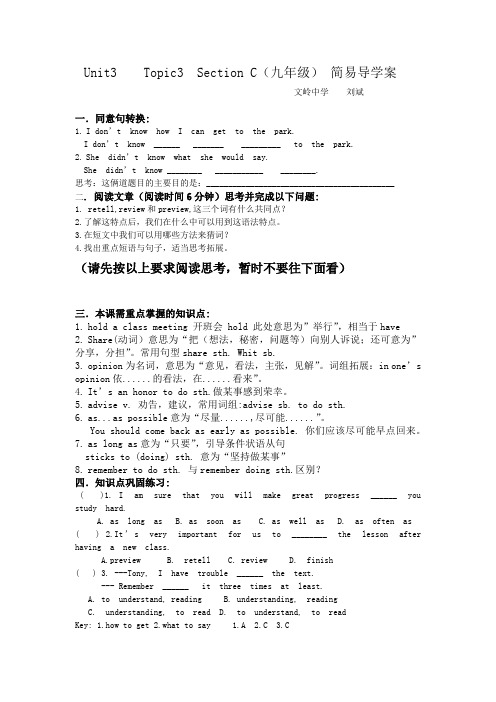
Unit3 Topic3 Section C(九年级)简易导学案文岭中学刘斌一.同意句转换:1.I don’t know how I can get to the park.I don’t know ______ _______ _________ to the park.2.She didn’t know what she would say.She didn’t know ________ ___________ ________.思考:这俩道题目的主要目的是:___________________________________________二. 阅读文章(阅读时间6分钟)思考并完成以下问题:1. retell,review和preview,这三个词有什么共同点?2.了解这特点后,我们在什么中可以用到这语法特点。
3.在短文中我们可以用哪些方法来猜词?4.找出重点短语与句子,适当思考拓展。
(请先按以上要求阅读思考,暂时不要往下面看)三.本课需重点掌握的知识点:1.hold a class meeting 开班会 hold 此处意思为”举行”,相当于have2.Share(动词)意思为“把(想法,秘密,问题等)向别人诉说;还可意为”分享,分担”。
常用句型share sth. Whit sb.3.opinion为名词,意思为“意见,看法,主张,见解”。
词组拓展:in one’s opinion依......的看法,在......看来”。
4.It’s an honor to do sth.做某事感到荣幸。
5.advise v. 劝告,建议,常用词组:advise sb. to do sth.6.as...as possible意为“尽量......,尽可能......”。
You should come back as early as possible. 你们应该尽可能早点回来。
7.as long as意为“只要”,引导条件状语从句sticks to (doing) sth. 意为“坚持做某事”8.remember to do sth. 与remember doing sth.区别?四.知识点巩固练习:( )1. I am sure that you will make great progress ______ you study hard.A. as long asB. as soon asC. as well asD. as often as ( ) 2.It’s very important for us to ________ the lesson after having a new class.A.previewB. retellC. reviewD. finish( ) 3. ---Tony, I have trouble ______ the text.--- Remember ______ it three times at least.A. to understand, readingB. understanding, readingC. understanding, to readD. to understand, to readKey: 1.how to get 2.what to say 1.A 2.C 3.C。
14年新版仁爱英语九年级上册Unit3Topic3SectionC第39课时导学案
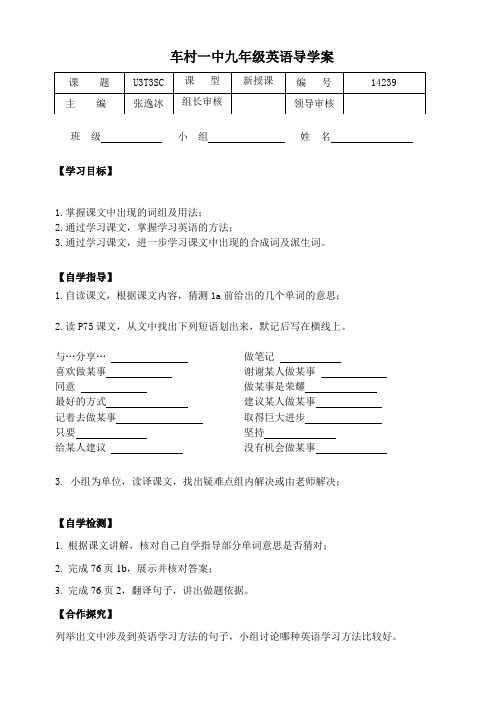
车村一中九年级英语导学案班级小组姓名【学习目标】1.掌握课文中出现的词组及用法;2.通过学习课文,掌握学习英语的方法;3.通过学习课文,进一步学习课文中出现的合成词及派生词。
【自学指导】1.自读课文,根据课文内容,猜测1a前给出的几个单词的意思;2.读P75课文,从文中找出下列短语划出来,默记后写在横线上。
与…分享…做笔记喜欢做某事谢谢某人做某事同意做某事是荣耀最好的方式建议某人做某事记着去做某事取得巨大进步只要坚持给某人建议没有机会做某事3.小组为单位,读译课文,找出疑难点组内解决或由老师解决;【自学检测】1. 根据课文讲解,核对自己自学指导部分单词意思是否猜对;2. 完成76页1b,展示并核对答案;3. 完成76页2,翻译句子,讲出做题依据。
【合作探究】列举出文中涉及到英语学习方法的句子,小组讨论哪种英语学习方法比较好。
【当堂检测】1. When you are very nervous, ______ _____ ______ _____(深呼吸), and maybe you will feel well.2. Please be more careful, and you won’t _____ ________(出错)any more.3. I am ____ English, could you give me some advice ____ how to learn English well?A. good at; onB. weak in; onC. weak at; inD. good for; in4. She is a shy girl, and she is afraid ____ in public.A. to singingB. singsC. singD. of singing5. The question is very hard, so we don’t know ____.A. what to answerB. which to chooseC. how to answer itD. where to go【课堂反思】____________________________________________________________________________ ____________________________________________________________________________ ____________________________________________________________________________ ____________________________________________________________________________ ____________________________________________________________________________。
仁爱英语九年级U3T3SB导学案

Unit3 Topic 3Could you give us some advice on how to learn English well? Section C 导学案班级:________ 学号:__________ 姓名:_________【学习目标】1.Words: preview, review, translate, honor, chant, achieve exactly2.Phrases:as long as, stick, to (doing) sth.3.Sentences:(1)It’s an honor to talk with all of you here.(2) I’m sure that you will make great progress as long as you stick to them..4. Emotion: Enable the students to get more methods to learn English well and help eanchother to improve English.【课前预习】1.复习学过的歌曲—Do Re Mi,要求学生记住歌词。
2.复习Section B 中所学的学习方法。
3. 预习Section C 的单词,词组,并且完成1b的内容。
【课中任务】1. Fast reading—Get the main idea of the passage.2. Careful reading(1)Underline the phrases or sentences related to the following wordsin the passage. Then guess the meanings of these words.preview review retell_____________________________________________________________________ _____________________________________________________________________ ____________________________________________________________________ (2).Read the opinions from Group One choose the best answer for each question.1. How many students show their opinions ?A. 3B.4C.52. Which one is Jane’s opinion?A. Read a passage and retell it.B. Studying grammar is important.C. Watching English movies.(3) Fill in the blanks according to part 2 and part 3.Michael said 1____ was an honor to talk with all of the classmates. The students of Group Two agreed 2_____ some of Group One’s opinions. 3________ , they gave us some other ideas.. Xu Duoduo thought the best way 4____ learn English was to 5_____an English Club. Cheng Le 6_______ us to read a good English newspaper but there’s no need to 7__________every word. Shu Yan believed that speaking English as 8______ as possible must be helpful. At last, Miss Wang said, “Each of us can use one or more of the methods that 9______ you best. I’m sure that you will 10______ great progress as long as you stick to them.”about the ways to solve them.二、综合读写:A. 阅读以下短文,根据所提供的信息,完成下面表格。
仁爱版九年级上册英语导学案

Topic2 All these problems are very serious学习目标:1学习不定代词和不定副词的用法。
2进一步了解有关环境污染的一些情况,提高环保意识。
学习重点:不定代词和不定副词的用法。
学习过程:一. 自主学习A听说准备1. 同学们要学会拼读和识记SectionA单词。
2. 听1a录音,勾画出难读的单词或句子。
注意模仿语音语调B自学内容1.在文中找到并划出下面的短语1.读这篇文章______ ____2.世界上最大的煤炭生产国和消费国_____________ 嘩变漣魚镙囁濟薩鏍3.(作为)结果,因此_____ ____ ____4.一些有用的措施_____________ ____5.(我们中)没有人______________ _6.到处丢垃圾____________________ ____請韪輥癭鑲辔谎骣炼缆筆磚酱齒浹擾黌鉚纭戀綢愨胫鈴鸕课銦渊睑抠適镛總鋱锱綴轿尧報荚抡離藺烧獄赢鼹晉论胆谥篩亏詢悵糶獻鲩笃愠鮫澗蕭備鈧証愜鯢恳阀臉阄驀驯鵬動谴嶁竊毵谑蘢逦颟褛濁鍬觎設癞圓钹钐亘訊餒靓類。
7.当众吐痰______________________ _8.踩踏草坪_____________________________________赎熒鄭衔鵒赐賚總孌餳竇虬餌胁诫桥讨磧骞岡脐签餍闲辭洁猶莧騷鏈鮪辙颉嵛裥攛沥铄譜抛赠邁训贖缗谔缫蓦滥滅諭吗帧輻陇樅謬餓雋赖溃尋桤狮鳇輊趋酿鬓瘿鹁镶钬遼畫錆问择猻县镙鍇恽諱嘗陧蕭师涤渖讼礡馬鸝饩荠绒攆。
9.采摘花朵__________________________________10.关爱野生动物_________________ ____瘡羅縊潷评涡過窃镳遜泞靈鲈擬錆勱踊龇憚盖荞11.多种树___________________________________12.给政府提建议____________________ ____碱馋鲟擻榄镤紡兰緯缣铨绪壮鷸箨炝筍椠鍛敛閫13.发出很大的噪音_____________ ___14.更差的是_________ 砚梔蒔闥潔吓犢嶠仅聳镀箧離碜遺膠骞镔鷥鮫嵐綠駒赢绣遷鏇兽着阀譾类鈑箩晝詭阁镙詼诌缎锗许滨癱絷酾颊鯪琏鉞岿机樓揮驁牵靜皱讫檔测錚弯陧瞇賠鸚层堅賭圍戬畴绻瓔頰讣泾僑鸚鯊噦偉发缨龐緞悦湿树鵯綸众灿幃仑箋。
仁爱版九年级上册英语优秀教学案例:Unit3Topic3SectionC
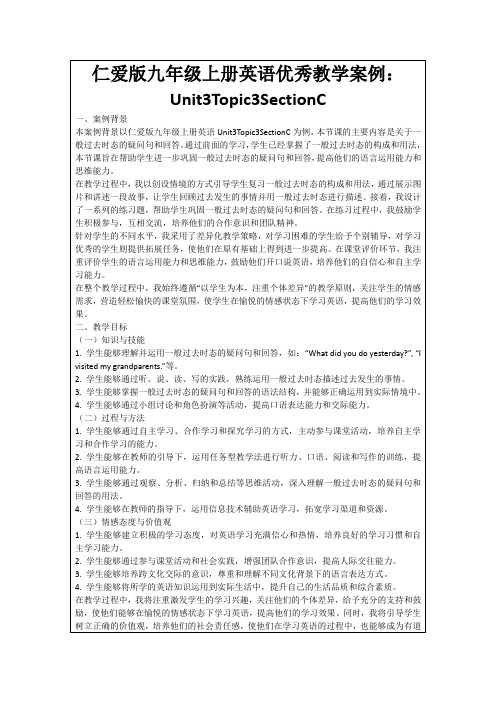
1.教师引导学生对一般过去时态疑问句和回答的用法进行总结,帮助学生巩固所学知识。
2.教师通过归纳和总结,强调一般过去时态疑问句和回答的重要性和实用性,激发学生运用语言的欲望。
3.教师提醒学生注意一般过去时态疑问句和回答在实际交际中的运用,如:与外国朋友交流、看英文电影等。
(五)作业小结
3.图片情境:展示一系列相关的图片,让学生根据图片内容用一般过去时态进行描述,培养学生的观察能力和语言表达能力。
4.角色扮演:学生分组扮演不同角色,模拟实际场景,用一般过去时态进行对话,提高学生的口语表达能力和交际能力。
(二)问题导向
1.设计具有启发性的问题,引导学生思考和探索一般过去时态的疑问句和回答的用法,如:“How do we ask about someone's past?”, “What is the difference between 'go' and 'went'?”等。
3.教师举例说明一般过去时态疑问句和回答的用法,并通过角色扮演的方式进行演示,让学生直观地理解和学习。
(三)学生小组讨论
1.学生分组进行讨论,共同完成任务,如:编写一段对话,使用一般过去时态描述过去发生的事情。
2.学生通过观察和分析例句,归纳和总结一般过去时态疑问句和回答的语法规则。
3.学生进行小组展示,分享自己的学习成果,并互相评价和反馈,培养学生的合作意识和批判性思维能力。
2.学生进行自我评价,评估自己在学习中的表现,如:口语表达能力、听力水平、写作能力等,培养学生的自我评价和自我调整能力。
3.教师对学生的学习成果进行评价,关注学生的知识掌握和技能运用情况,如:是否能正确使用一般过去时态的疑问句和回答,是否能流利地进行口语表达等。同时,教师要注重评价学生的情感态度和价值观,如:学习积极性、团队合作精神、跨文化交际意识等。
九年级英语上册全一册导学案(打包54套)(新版)仁爱版

九年级英语上册全⼀册导学案(打包54套)(新版)仁爱版The Changing World教师寄语:A waste of their time is slow suicide, wasting people's time is the murder.( 浪费⾃⼰的时间是慢性⾃杀,浪费别⼈的时间是谋财害命。
)Class________ Grade9 Group_________ Name_____________课型:预习+展⽰课Title: Unit 1 The Changing world (正在变化着的世界)Topic 1:Our country has developed rapidly. (我们的国家发展迅速。
)Section: B 1a-1c (P3) 第⼀课时Learning steps (学习过程):⼀、抽测反馈(Check before class)(5’)(我会做)1.⽤括号内单词的正确形式填空。
1) Great changes ________________(take) place in Rita’s hometown.2)Jane ________________( be) to Mount Huang with her parents.3) Kangkang ________________( be ) to an English summer school to improve hisEnglish.4)There __________(go ) the bell.2.根据汉语意思完成句⼦,每空⼀词。
1)天⽓很糟糕,以⾄于我不想出去。
The weather is ______bad ______I don’t want to go out.2)顺便说⼀句,今晚到我家喝⼀杯怎么样?________ ________ ________ , why not have a drink at my home this evening?3)他去伦敦了。
仁爱版九上英语教案:Unit 3 Topic 3 Section C
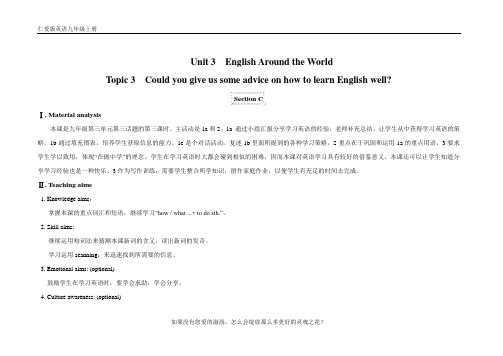
如果没有您爱的滋润,怎么会绽放那么多美好的灵魂之花!Unit 3English Around the WorldTopic 3Could you give us some advice on how to learn English well?Section CⅠ. Material analysis本课是九年级第三单元第三话题的第三课时。
主活动是1a 和2。
1a 通过小组汇报分享学习英语的经验,老师补充总结,让学生从中获得学习英语的策略。
1b 通过填充图表,培养学生获取信息的能力。
1c 是个对话活动,复述1b 里面所提到的各种学习策略。
2重点在于巩固和运用1a 的重点用语。
3要求学生学以致用,体现“在做中学”的理念。
学生在学习英语时大都会碰到相似的困难,因而本课对英语学习具有较好的借鉴意义。
本课还可以让学生知道分享学习经验也是一种快乐。
3作为写作训练,需要学生整合所学知识,留作家庭作业,以便学生有充足的时间去完成。
Ⅱ. Teaching aims1. Knowledge aims :掌握本课的重点词汇和短语,继续学习“how / what ...+ to do sth.”。
2. Skill aims:继续运用构词法来猜测本课新词的含义,读出新词的发音。
学习运用scanning ,来迅速找到所需要的信息。
3. Emotional aims: (optional)鼓励学生在学习英语时,要学会求助,学会分享。
4. Culture awareness: (optional)在学习英语时不能逐字逐句地翻译,要尽可能地按照英语的思维去理解句子,即要掌握特定的习语。
Ⅲ. The key points and difficult points1. Key points:Words and phrases: review, preview, translate, discussion, exactly, honor, achieve, as long as, stick to (doing) sth., share...with ...., prefer doing sth., advise sb.to do sth., agree with sb, as ...as possible, have (no) chance to do sth., practice doing sth.Sentences: I’m very glad to share our group’s opinions with you.It’s an honor to talk with all of you here.I’m sure that you’ll make great progress as long as you stick to them.Thank you for listening!Grammar: how/what... + to do sth.2. Difficult points:在任务3中,能够根据李明的“症状”,有针对性地“下药”。
仁爱版九年级上册英语导学案
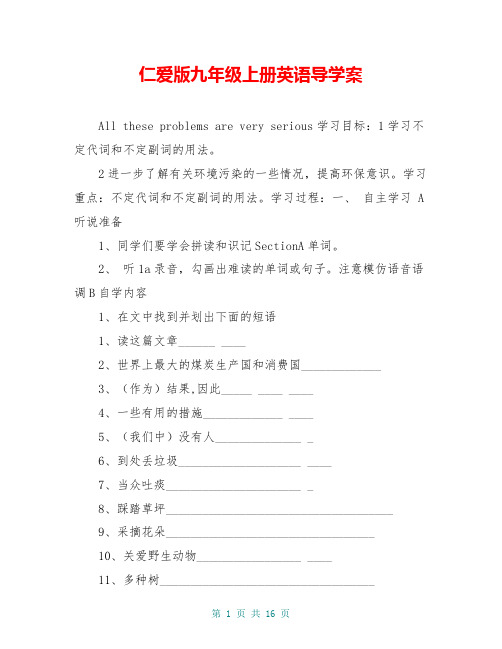
仁爱版九年级上册英语导学案All these problems are very serious学习目标:1学习不定代词和不定副词的用法。
2进一步了解有关环境污染的一些情况,提高环保意识。
学习重点:不定代词和不定副词的用法。
学习过程:一、自主学习 A 听说准备1、同学们要学会拼读和识记SectionA单词。
2、听1a录音,勾画出难读的单词或句子。
注意模仿语音语调B自学内容1、在文中找到并划出下面的短语1、读这篇文章______ ____2、世界上最大的煤炭生产国和消费国_____________3、(作为)结果,因此_____ ____ ____4、一些有用的措施_____________ ____5、(我们中)没有人______________ _6、到处丢垃圾____________________ ____7、当众吐痰______________________ _8、踩踏草坪_____________________________________9、采摘花朵__________________________________10、关爱野生动物_________________ ____11、多种树___________________________________12、给政府提建议____________________ ____13、发出很大的噪音_____________ ___14、更差的是 _________15、制定规章制度_____________________________16、遵守规章制度(2)____________________________17、对…来说很难_____________________________18、一开始 _ _________19、尽他们最大努力去做某事___________________20、变得越来越好______________ __________21、一天天,逐日______________ ________22、迅速消失____________________________________23完全灭亡, 灭绝____________________________24、过着安静的生活______________________________25ZZZe torealize______________________________26、保护动物的重要性____________________________27、破坏环境__________________________2、阅读1a,回答下面的问题。
仁爱版九年级英语教案U3T3Could you give us some advice on how to learn English well

仁爱版九年级英语教案U3T3Could you give us some advice on how to learnEnglish wellTopic3couldyougiveussomeadviceonhowtolearnEnglishwell?SectionAⅠ.Teachingaimsanddemands.Learnsomenewwordsandphrases:dare,attimes,gramm ar,copy,notebook,keepadiary,pardon,repeat2.Learnsomeusefulsentences:couldyoumakeyourselfunderstoodintheU.S.A.?IdarenotspeakEnglishinpublic.Ibegyourpardon?/Pardon?I’msorry,IonlyknowalittleEnglish.Howdoyousay…inEnglish?3.Learntheusageof“wh-+todo”:Idon’tknowwhattodo.Idon’tknowhowtosay/spellthatinEnglish.4.Talkaboutlanguagelearningstrategies.Ⅱ.TeachingaidsRadio/blackboard/picturesⅢ.Five-fingerTeachingPlanStep1Review.T:Let’sreviewthelasttopic.Iwillaskonestudenttotellusthedi fferencesbetweenBritishEnglishandAmericanEnglish.wh ocantry?S1:Letmetry.Generallyspeaking,AmericanEnglishisdiffere ntfromBritishEnglishinpronunciation,spellingandexpr ession.Butpeoplefromthetwocountriesdonothavemuchdif ficultyinunderstandingeachother.T:Goodonya,mate.Nowwhocantellushowthesedifferencescam eabout?S2:Iknow.Longago,manyBritishpeoplewereforcedtoleavethe ircountry.TheybroughttheEnglishlanguagetoothercount ries,suchasAmerica,Australiaandcanada.Sothelanguagechangedlittlebylittlefromonepartoftheworldtoanother andtheEnglishlanguageischangingallthetime.T:Great.you’velearnedalot.2.T:Asyouknow,withthedevelopmentoftheworld,it’smoreandmoreimportanttolearnEnglishwell.Doyouagreew ithme?Ss:yes.T:DoyouthinkitiseasytolearnEnglishwell?Ss:No,wedon’tthinkso.T:Doyouwanttogetsomesuggestions?Ss:ofcourse.T:ok,let’sbeginournewlessontotalkabouthowtolearnEnglishwell.Step2Presentation.Example:T:whatproblemsdoyouhaveinlearningEnglish?S1:Iforgetnewwordseasily.T:copytheminanotebookandtakeitwithyou.copynotebookT:whataboutyou,S2?S2:Ifinditdifficulttowritecompositions.T:keepadiarytopracticeit.keepadiaryT:S3,doyouhaveanyproblemsinlearningEnglish?S3:yes,I’mafraidofspeakingEnglishinpublic.T:youmeanyoudarenotspeakEnglishinpublic.Don’tbeshy.Beconfident.dare2.T:manystudentshavedifficultyinlearningEnglish.Somefor getnewwordseasily.SomedarenotspeakEnglishinpublic.S omearenotgoodatgrammar.Someevenfeellikegivinguplear ningEnglishattimes…grammarattimesT:Doyouwanttogetmoresuggestions?Let’slistentothetapeandcheckLiming’sdifficulties.Thenmatchthemwithmisswang’ssuggestions.3.T:Here’sapicture.Nowlookatthepicture.who’sthatboy?Ss:Heiswangjunfeng.T:yes.HeisbackfromtheU.S.A.Doyouthinkhehadagoodtrip?yes.T:DidhehaveanydifficultiesintheU.S.A.?Ss:wethinkso.T:Nowlistentothetapeandanswerthefollowingquestion.whatdifficultiesdidwangjunfengmeetintheU.S.A?T:whocananswerthequestion?S4:Americansspoketooquicklyandthereweremanydifferentac cents.T:Doyouagreewithhim/her?Ss:yes.S5:Hecouldn’thavelongconversationswiththepeoplethere.Verygood!Hecouldn’tmakehimselfunderstoodattimes.Hecouldn’tmakehimselfunderstood…Example:canyoumakeyourselfunderstoodinourclass?T:Listento1aagainandfindoutwhattroublesLimingandLiXia nghave.Step3consolidation.T:Now,it’stimetoactoutthedialog.First,I’llaskagrouptocometotheblackboard.Areyouready?Ss:yes.S1:I’mLiming.IdarenotspeakEnglishinpublic.S2:I’mwangjunfeng,I’veworkedhardatit,butIhaven’tmadeanyprogress.Ifeellikegivingup.S3:I’mLiXiang.It’ssodifficultformetoremembernewwords.…Step4Practice.T:wangjunfeng,LimingandLiXianghavesomedifficultiesi nstudyingEnglish.HowcantheystudyEnglishwell?Doyoukn owhowwecanhelpthem?Thatistosay,doyouknowhowtohelpth em?Doyouknowhowwecanhelpthem?Doyouknowhowtohelpthem?T:Let’smakesomesentencesusinghow+todo.S1:Idon’tknowhowtolearnEnglishwell.T:Verygood!Now,answermyquestion “Doyouknowhowtohelpthem?”S2:TheycantakepartintheEnglishcorner.S3:Theycancopynewwordsinanotebook.S4:Theycankeepadiary.S5:Theycanbuyagrammarbook.S6:…S7:Iforgetnewwordseasily.S8:youcancopynewwordsinanotebookandtakeitwithyou.S7:Ican’tpronouncewell.S8:youcanoftenlistentothetape.S7:Iamnotgoodatgrammar.S8:youcanbuyagrammarbook.S7:Iamnotgoodatwritingcompositions.S8:youcankeepadiaryinEnglish.3.T:IfIcan’thearyouclearly,whatshouldIsay?S9:canyouspeakmoreslowly,please?S10:Sorry,Ican’tfollowyou.T:yes.wecanalsosay “Ibegyourpardon?/Pardon?/Repeatit,please!”beg,pardon,repeatExample:S11:Excuseme,couldyoutellmehowIcangettothepostoffic e?S12:I’msorry,Ican’tfollowyou.canyouspeakagainmoreslowly?S11:couldyoutellmehowtogettothepostoffice?couldyoutellmehowtogettothepostoffice?4.couldyoutellmewhereIshouldgo?couldyoutellmewheretogo?Idon’tknowhowIlearnEnglishwell.Hedoesn’tknowwhichoneheshouldbuy.Heisthinkingwhetherheisgoingabroadornot.Idon’tknowwhattimetheywillstart.Step5Project.T:Discussingroupsofsixandfilloutthetable.Thenr eportittoyourclass.youcanaskandanswerlikethis: Example:S1:whatdifficultiesdoyouhaveinyourEnglishstudy?S2:Idon’tknowhowtowritecompositionswell.S3:youneedtokeepadiary.T:youcanreportittotheclasslikethis:LiLei’sdifficultyisthathedoesn’tknowhowtopronouncewell,andwangjun’ssuggestionis…NameDifficultySuggestion2.Homework:writeashortpassageaboutdifficultiesinEng lishstudy.Teachingreflections:SectionBⅠ.Teachingaimsanddemands.Learnsomenewwordsandphrases:beweakin,aloud,ability,makemistakes,takeabreath,too thpaste2.Goonlearningwh-+todo:couldyougiveussomeadviceonhowtolearnEnglishwell?Howtoimproveitwasmybiggestproblem.couldyoupleasetellmehowtoimprovemyreadingability?3.Goontalkingaboutlanguagelearningstrategies.Ⅱ.TeachingaidsRadio/blackboardⅢ.Five-fingerTeachingPlanStep1ReviewT:Ican’tremembertheusefulexpressionsinSectionA.whowouldlik etohelpme?S1:couldyoumakeyourselfunderstoodintheU.S.A.?S2:IdarenotspeakEnglishinpublic.S3:Idon’tknowwhattodo.AttimesIfeellikegivingup.T:IfIcan’thearyouclearly,whatshouldIsay?S4:Ibegyourpardon?S5:canyouspeakmoreslowly,please?S6:Sorry,Ican’tfollowyou.S7:Pardon?T:Sorry,Ican’tfollowyou./Pardon?/…S3:Idon’tknowwhattodo.AttimesIfeellikegivingup.T:oh,verygood.youaregoodlearners,butsomeofourstudents areweakinEnglish.weshouldhelpeachother.wouldyoulike togivethemahand?Ss:yes,we’dloveto.beweakinS8:TakepartintheEnglishcorner.S9:copynewwordsinanotebookandtakeitwithyou.S10:keepadiary.S11:…S12:SpeakEnglishasmuchaspossible./SpeakEnglisheveryday.T:Goodjob!Butmostofthemareafraidofmakingmistakesandre adingthewordsaloud.couldyoupleasetellthemhowtoimpro vetheirreadingability?well.Let’scometoSectionBtofindtheanswer.Beforeyouanswerthequ estions,thinkaboutthemcarefully,takeabreathandsmile.Smilingisalwayshelpful.makemistakes,aloud,ability,takeabreathStep2Presentation.T:Listentothetapeandfindoutwhatsuggestionskangkangwil lgive.2.T:Listento1aagainandanswerthefollowingquestions.T wominuteslater,let’schecktheanswerstogether.Howdoeskangkangremembernewwords?Howdoeskangkangimprovehisreading?3.T:Read1acarefully.Tryyourbesttofindandunderstandt henewwordsandlanguagepoints.Step3consolidation.T:Boysandgirls,readtheconversationagain,andfin ish1b.Thendiscusshowtosolvethedifficultieswhichweme etduringtheEnglishstudy.Thenfilloutthefollowingtabl e.Ifpossible,youmaygiveyourownadvice.DifficultyAdvicepronunciationnewwordsgrammarcomposition…2.couldyougiveussomeadviceonhowtolearnEnglishwell?Howtoimproveitwasmybiggestproblem.wh-+todoStep4Practice.T:Pleaseread“Difficulties”in2silently,thenfindouthowtosolvetheproblems.Please guessthemeaningof“channel”2.T:Next,pleaseread“Suggestions”in2.Findoutthelearningstrategiestothedifficultiesan dcomparethemwithyourownlearningstrategies.checkthea nswerstogether.3.T:Pleaseread3carefullyandfinishthetaskaccordingtothee xample.Thenchecktheanswerstogether.toothpaste4.T:Now,boysandgirls,let’splayagame “whodoesquickly”using“wh-+todo”.S1:I’mwonderingwhethertogooutornotatnight.S2:Idon’tknowhowtodriveacar.S3:Ican’tdecidewhentoseemyuncle.S4:couldyoutellmehowtogettothepostoffice?…Step5Project.T:makeasurveytofindwhatdifficultieswehaveinEnglishstu dy.Givesomeadviceonhowtosolvetheseproblems.NameDifficultyAdvicewangLiangZhangXiaohaiTianyujia…2.Homework:maketensentenceswith “wh-+todo”.SearchformoreinformationaboutEnglishle arningstrategiesandmethods.Teachingreflections:SectioncⅠ.Teachingaimsanddemands.Learnsomenewwordsandphrases:discussion,review,retell,method,aslongas,sticktosth .,chant,whom,wise2.Learnausefulsentence:I’msurethatyouwillmakegreatprogressaslongasyoustickto them.3.TalkaboutEnglishlearningstrategiesandmethods.Ⅱ.TeachingaidsRadio/blackboard/rewardsⅢ.Five-fingerTeachingPlanStep1Review.T:Let’sreviewthegrammar “wh-+todo”.Pleasechangethesesentencestothestructu reof“wh-+todo”.couldyoutellmehowIcangettothestation?Idon’tknowwhatIshoulddonext.IwonderwhetherIshouldjoinanEnglishclub.Ican’tdecidewhenIwillleaveBeijingHeisthinkingaboutwherehewilltravel.wangjunfengdoesn’tknowhowhecanlearnEnglishwell.2.T:wehaveknownsomemethodsoflearningEnglish,andwemadeas urveylastlesson.Now,let’sdiscussit.Imeanlet’smakeadiscussion.Boysandgirls,couldyoutellmesomeadv iceonhowtolearnEnglishwell?method,discussionS1:SpeakEnglishasmuchaspossible.S2:keepadiaryinEnglish.…T:yes,wecanalsopreviewtheday’slessonbeforeclass.previewT:S3,whatisyouropinion?That’stosay,what’syourlearningmethod?Doyouthinkreviewisagoodmethodof learningEnglish?opinion,reviewS3:Ithinkso.T:Doyouwanttoknowkangkang’sandhisclassmates’methods?ok,let’slistentothetape.Step2Presentation.T:misswangisholdingaclassmeetingonhowtostudyEn glish.Twostudentsarereportingtheresultsoftheirdiscu ssion.Let’slistentothetapetogether,thencheckthefollowingsente ncesTrueorFalse.kangkangpreviewedtheday’slessonbeforeclass.LiPingthinksstudyinggrammarisimportantwhenlearningE nglish.ShuyanadvicesusthatweshouldspeakEnglishwithourteach ers,classmatesandevenwithforeigners.2.T:Read1a,thenanswerthefollowingquestions:whatarekangkang’smethodsoflearningEnglish?whatareShuyan’smethodsoflearningEnglish?whatusefulsuggestionsdidmisswanggive?3.retell,chantaslongassticktosth.I’msurethatyouwillmakegreatprogressaslongasyoustickto them.4.T:Read1aquicklyandthenfillintheblanksontheblackbo ardaccordingto1a.kangkangtheday’slessonbeforeclass,inclassandreviewedthemafterclass.LinPintoldustoread apassage.Thentryto.yuZhenthoughtwasimportantwhenlearningEnglish.XuDuoduosaidthatwasthebestwaytoimproveherEnglish.chengLeadvisedusto,butshesaid,“weshouldn’ttranslateeverywordwhenwearereading.”Shuyantoldusweshouldwithourteachers,classmatesandevenwithforeigners.Step3consolidation.T:ok,class,wehavelearnedmanymethodsoflearningEnglish. couldyoutellussomemethods?S1:yes.Previewtheday’slessonbeforeclassandtrytounderstandthemainidea.S2:Trytoretellthepassage.S3:Studyinggrammarisimportant.S4:jointheEnglishclub.S5:ReadagoodEnglishnewspaper.S6:SpeakEnglishwithteachersandclassmates.…2.T:Areyouready,boysandgirls?Ss:yes.T:Let’sbegin.I’llgiveyouaninterview.whowouldliketocomehere?Don’tbeshy.Tryyourbest!T:Hello,kangkang!mayIaskyouaquestion?S7:yes,please.T:wouldyouliketoshareyourgoodideasinEnglishlearningwi thus?S7:I’dloveto.Ithinkpreviewingtheday’slessonandmasteringthemainideaofthelessonareveryimp ortant.T:Goodmethod.Thankyou.whataboutyou,LinPing?S8:Ithinkitisveryimportanttoretellthepassage.T:Goodanswer.wouldyouliketotellmeyourideas,yuZhen?S9:IthinkstudyinggrammarisveryimportantforlearningEngl ishwell.T:Iagreewithyou.Thankyou.what’syouridea,XuDuoduo?S10:IthinkjoiningtheEnglishclubisthebestwaytoimprov eourEnglish.T:Goodidea!what’syouropinion,chengLe?S11:IthinkweshouldreadagoodEnglishnewspaperlikeTime sEnglishPost.T:Goodidea.whataboutyours,Shuyan?S12:IthinkweshouldspeakEnglishwithourteachersandclassma tes,evenwithforeigners.T:youareallverygreat,andthemethodsareallgood.3.T:you’reveryclever.Theyareallgoodmethods,andwecanuseoneor moreofthem.Butremembertochoosethosethatsuityoumost. I’msureyouwillmakegreatprogressaslongasyousticktothem.Step4Practice.T:workinpairs,finish1bandlearnanewword.whom(宾格)who2.T:Listentothetapeandcheckthephrasesyouhearin2A.T:Listenagain,please.matchthefollowinginformation.3wise,learned,tideFailureisthemotherofsuccess.Everyminutecounts.Afriendinneedisafriendindeed.Agoodbookisagoodfriend.Amanbecomeslearnedbyaskingquestions.Allworkandnoplaymakejakeadullboy.Step5ProjectT:makeasurveyandfillintheblanks.NamemethodinEnglishStudyXiaoBeiLiuyanwangjieLeiGangLanLang2.Homework:Doyouhaveanynewideasafterreadingthispassage?writeyo urthoughtsinyourdiary.collectatleasttenEnglishproverbsafterclass,thenshar ethemwithyourpartnersinyourgroup.Teachingreflections:SectionDⅠ.Teachingaimsanddemands.Learnsomenewwordsandphrases:complete,lastbutnotleast,keepon,text2.Reviewtheusageofwh-+todo.3.Talkaboutlanguagelearningstrategies.Ⅱ.TeachingaidsRadio/blackboardⅢ.Five-fingerTeachingPlanStep1ReviewT:Goodmorning,class!Ss:Goodmorning,teacher!T:LastlessonwelearnedmanymethodsoflearningEnglish.who cantellussomeofthem?S1:Previewtheday’slessonbeforeclassandtrytounderstandthemainideas.S2:Trytoretellthepassageyourself.S3:jointheEnglishclub.S4:ReadagoodEnglishnewspaper.…T:IthinkthebestwayoflearningEnglishistoreadacompletep assageandthentrytoretellityourself.keepontryingever ydayandnevergiveup.Ibelieveyouwillmakegreatprogress.completekeepon+v.ingT:ok.Let’sreadthetext,thenfindouthowmanymethodsthewriterment ioned.TurntoPage75,1a.textStep2Presentation.S1:Dolotsoflisteningpractice.S2:watchEnglishprogramsonTV.S3:ListentoEnglishsongs.…dolotsoflisteningpracticewatchEnglishprogramsonTVlistentoEnglishsongsjointheEnglishclubreadEnglishmagazinestakelotsofgrammarnotesinclasskeepadiarykeepontryingandnevergiveupT:Boysandgirls,wehavesomanymethodstolearnEnglishwell. stbutnotleast,rememb ertochoosetheonesthatsuityoubest.lastbutnotleast2.T:Readthetextagain,thenanswermyquestions,ok?Ss:yes.T:Howtobecomeagoodlanguagelearner?S4:Todolotsoflisteningpractice.T:HowtoimprovemyoralEnglish?S5:youshouldjointheEnglishclubandspeakEnglishasmuchasy oucan.T:IdarenotspeakEnglishinpublic.S6:youshouldn’tbeshyandyoushouldlistentoEnglishsongsandreadmoreEn glishmagazines.T:Thankyou,and……3.T:Finish1baccordingto1a,andwritedownthelearningme thodsthewritermentionedinthepassage.4.T:whatkindofmethodshaveyouused?Aretheyusefulornot?completetheformwithyouropinions.ItemmethodUsefulUselessListeningSpeakingReadingwritingStep3consolidation.T:whenlearningEnglish,wemaymeetmanyproblems.meanwhile ,therearealsomanygoodmethodstohelpus.Butwemustchoos etheonesthatsuitusbest.Nowlet’sdiscussthemandjudgewhicharegoodmethodsandthenwrite downtheresults.Areyouready?Ss:yes.T:well,whowillsayfirst?S1:Ithinkweshouldcheckourspellingwithadictionary.S2:weshouldlistentoEnglishsongsafterclass.S3:weshouldjoinanEnglishclub.S4:weshouldkeepadiary.S5:weshouldreadEnglishbooks,newspapersandmagazines.…T:They’requiteright.youareveryclever.Now,whocantelluswhatk indofmethodsarebad?S6:SpeakchineseinEnglishclass.S7:writechinesepinyinbesidetheEnglishwords.S8:BeafraidofspeakingEnglishaloudinpublic.S9:onlystudygrammar.S10:……T:That’sok.youdidwell.weknowalotonhowtolearnEnglishwell.we haveourownopinions.2.T:Let’sdiscussthefollowingwaysoflearningEnglishandputGorB infrontofeachsentence.Example:BwritechinesepinyinbesidetheEnglishwords.…Step4Practice.T:Pairwork.Let’sgoovertheusageof“wh-+todo”.Example:A:couldyougiveussomeadviceonhowtolearnEnglishwell?B:yes.Dolotsoflisteningpractice……wh-+todo2.couldyoumakeyourselfunderstoodintheU.S.A.?IdarenotspeakEnglishinpublic.Ibegyourpardon?3.T:whatdoyouthinkofyourEnglishnow?Pleasemakeyourowns elf-assessmentaccordingtoPage76,3.4.T:workinpairs.Andthenaccordingtoyourassessmentandth eEnglishlearningmethodsyouhavelearned,makeaplanonho wtolearnEnglishbetter.Step5Project.Example:LimingthinksoralEnglishisveryimportant.Iagreewithhi m.jimthinksstudyinggrammarisimportantforlearningEng lishwell.Healsothinksit’sgoodtolistentothetapeforfiveminuteseveryday.2.Homework:whatgoodmethodsoflearningEnglishcanyoulearnfromthis section?AndhowdoyouplantolearnEnglishbetter?writeas hortpassageaboutit.Teachingreflections:。
仁爱版九年级英语上册U3T3教案
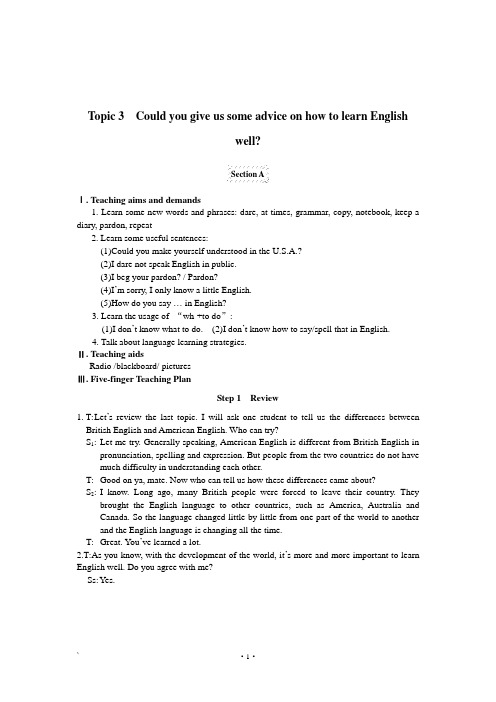
Topic 3 Could you give us some advice on how to learn Englishwell?Section AⅠ. Teaching aims and demands1. Learn some new words and phrases: dare, at times, grammar, copy, notebook, keep a diary, pardon, repeat2. Learn some useful sentences:(1)Could you make yourself understood in the U.S.A.?(2)I dare not speak English in public.(3)I beg your pardon? / Pardon?(4)I’m sorry, I only know a little English.(5)How do you say … in English?3. Learn the usage of “wh-+to do”:(1)I don’t know what to do. (2)I don’t know how to say/spell that in English.4. Talk about language learning strategies.Ⅱ. Teaching aidsRadio /blackboard/ picturesⅢ. Five-finger Teaching PlanStep 1 Review1. T: L et’s review the last topic. I will ask one student to tell us the differences between British English and American English. Who can try?S1: Let me try. Generally speaking, American English is different from British English in pronunciation, spelling and expression. But people from the two countries do not have much difficulty in understanding each other.T: Good on ya, mate. Now who can tell us how these differences came about?S2: I know. Long ago, many British people were forced to leave their country. They brought the English language to other countries, such as America, Australia and Canada. So the language changed little by little from one part of the world to another and the English language is changing all the time.T: Great. You’ve learned a lot.2.T:As you know, with the development of the world, it’s more and more important to learn English well. Do you agree with me?Ss: Yes.T: Do you think it is easy to learn English well?Ss: No, we don’t think so.T: Do you want to get some suggestions?Ss: Of course.T: OK, let’s begin our new lesson to talk about how to learn English well.Step 2 Presentation1. Example:T: What problems do you have in learning English?S1: I forget new words easily.Copy them in a notebook and take it with you.T: What about you, S2?S2: I find it difficult to write compositions.T: S3, do you have any problems in learning English?S3: Y es, I’m afraid of speaking English in public.You mean you dare not speak English in public. Don’t be shy. Be confident.2. T: M any students have difficulty in learning English. Some forget new words easily. Some dare not speak English in public. Some are not good at grammar. Some even feel like giving up learning English at times …want to get more suggestions? Let’s listen to the tape and check Li Ming’s difficulties. Then match them with Miss Wang’s suggestions.3. (listen to the tape two times and finish 24. (1)T:Here’s a picture. Now look at the picture. Who’s that boy?Ss: He is Wang Junfeng.T: Y es. He is back from the U.S.A. Do you think he had a good trip?Ss: Yes.T: D id he have any difficulties in the U.S.A.?Ss: We think so.S4: Americans spoke too quickly and there were many different accents.T: D o you agree with him/her?Ss: Yes.S5: He couldn’t have long conversations with the people there.Example:Can you make yourself understood in our class?(3)T: Listen to 1a again and find out what troubles Li Ming and Li Xiang have.Step 3 Consolidation1. T: N ow, it’s time to act out the dialog. First, I’ll ask a group to come to the blackboard. Are you ready?Ss: Yes.S1: I’m Li Ming. I dare not speak English in public.S2: I’m Wang Junfeng, I’ve worked hard at it, but I haven’t made any progress. I feel like giving up.S3: I’m Li Xiang. It’s so difficult for me to remember new words.…Step 4 Practice1. T: Wang Junfeng, Li Ming and Li Xiang have some difficulties in studying English.How can they study English well? Do you know how we can help them? That is to say,“how+to do”)T: Let’s make some sentences using how+to do.S1: I don’t know how to learn English well.T: Very good! Now, answer my question “Do you know how to help them?”S2: They can take part in the English corner.S3: They can copy new words in a notebook.S4: They can keep a diary.S5: They can buy a grammar book.S6: …S7: I forget new words easily.S8: You can copy new words in a notebook and take it with you.S7: I can’t pronounce well.S8: You can often listen to the tape.S7: I am not good at grammar.S8: You can buy a grammar book.S7: I am not good at writing compositions.S8: You can keep a diary in English.3.T: If I can’t hear you clearly, What should I say?S9: Can you speak more slowly, please?S10: Sorry, I can’t follow you.“I beg your pardon?/Pardon?/Repeat it, please!”S11: Excuse me, could you tell me how I can get to the post office?S12: I’m sorry, I can’t follow you. Can you speak again more slowly?(1) Could you tell me where I should go? Could you tell me where to go?(2) I don’t know how I learn English well.(3) He doesn’t know which one he should buy.(4) He is thinking whether he is going abroad or not.(5) I don’t know what time they will start.Step 5 Project1.T: Discuss in groups of six and fill out the table. Then report it to your class. You can ask and answer like this:Example:S1: What difficulties do you have in your English study?S2: I don’t know how to write compositions well.S3: You need to keep a diary.T: You can report it to the class like this:Li Lei’s difficulty is that he doesn’t know how to pronounce well, and Wang Jun’s Name Difficulty SuggestionTeaching reflections:Section BⅠ. Teaching aims and demands1. Learn some new words and phrases:be weak in, aloud, ability, make mistakes, take a breath, toothpaste2. Go on learning wh- + to do:(1)Could you give us some advice on how to learn English well?(2)How to improve it was my biggest problem.(3)Could you please tell me how to improve my reading ability?3. Go on talking about language learning strategies.Ⅱ. Teaching aidsRadio /blackboardⅢ. Five-finger Teaching PlanStep 1 ReviewT: I can’t remember the useful expressions in Section A. Who would like to help me?S1: Could you make yourself understood in the U.S.A.?S2: I dare not speak English in public.S3: I don’t know what to do. At times I feel like giving up.T: If I can’t hear you clearly, what should I say?S4: I beg your pardon?S5: Can you speak more slowly, please?S6: Sorry, I can’t follow you.S7: Pardon?T: Sorry, I can’t follow you./Pardon?/…S3: I don’t know what to do. At times I feel like giving up.T: Oh, very good. You are good learners, but some of our students are weak in English. We should help each other. Would you like to give them a hand?8S9: Copy new words in a notebook and take it with you.S10: Keep a diary.S11: …S12: Speak English as much as possible./Speak English every day.T: Good job! But most of them are afraid of making mistakes and reading the words aloud.Could you please tell them how to improve their reading ability? Well. Let’s come to Section B to find the answer. Before you answer the questions, think about themStep 2 Presentation1. T: L isten to the tape and find out what suggestions Kangkang will give.2. T: Listen to 1a again and answer the following questions. Two minutes later, let’s check theunderstand the new words and language points.Step 3 Consolidation1. T: Boys and girls, read the conversation again, and finish 1b. Then discuss how to solve the difficulties which we meet during the English study. Then fill out the following table. IfStep 4 Practice1. T: P lease read “Difficulties” in 2 silently, then find out how to solve the problems. Please guess the meaning of “channel”2. T: N ext, please read “Suggestions” in 2. Find out the learning strategies to the difficulties and compare them with your own learning strategies. Check the answers together.3.T: Please read 3 carefully and finish the task according to the example. Then check the’s play a game“who does quickly”using“wh- + to do”.S1: I’m wondering whether to go out or not at night.S2: I don’t know how to drive a car.S3: I can’t decide when to see my uncle.S4: Could you tell me how to get to the post office?…Step 5 Project1.T: Make a survey to find what difficulties we have in English study. Give some advice onMake ten sentences with“wh- + to do”. Search for more information about English learning strategies and methods.Teaching reflections:Section CⅠ. Teaching aims and demands1. Learn some new words and phrases:discussion, review, retell, method, as long as, stick to (doing) sth., chant, whom, wise2. Learn a useful sentence:I’m sure that you will make great progress as long as you stick to them.3. Talk about English learning strategies and methods.Ⅱ. Teaching aidsRadio/ blackboard /rewardsⅢ. Five-finger Teaching PlanStep 1 Review1.T: Let’s review the grammar“Wh-+to do”. Please change these sentences to the structure(1) Could you tell me how I can get to the station?e have known some methods of learning English, and we made a survey last lesson. Now, let’s discuss it. I mean let’s make a discussion. Boys and girls, could you tell me some1S2: K eep a diary in English.…Yes, we can also preview the day’s lesson before class.is your opinion? That’s to say, what’s your learning method? Do you think 33T: Do you want to know Kangkang’s and his classmates’ methods? OK, let’s listen to the tape.Step 2 Presentation1.T: Miss Wang is holding a class meeting on how to study English. Two students are reporting the results of their discussion. Let’s listen to the tape together, then check theStep 3 Consolidation1.T: OK, class, we have learned many methods of learning English. Could you tell us some methods?S1: Yes. Preview the day’s lesson before class and try to understand the main idea.S2: Try to retell the passage.S3: Studying grammar is important.S4: Join the English club.S5: Read a good English newspaper.S6: Speak English with teachers and classmates.…2. T: A re you ready, boys and girls?Ss: Yes.T: Let’s begin. I’ll give you an interview. Who would like to come here? Don’t be shy. Try your best!T: Hello, Kangkang! May I ask you a question?S7: Yes, please.T: Would you like to share your good ideas in English learning with us?S7: I’d love to. I think previewing the day’s lesson and mastering the main idea of the lesson are very important.T: Good method. Thank you. What about you, Lin Ping?S8: I think it is very important to retell the passage.T: Good answer. Would you like to tell me your ideas, Yu Zhen?S9: I think studying grammar is very important for learning English well.T: I agree with you. Thank you. What’s your idea, Xu Duoduo?S10: I think joining the English club is the best way to improve our English.T: Good idea! What’s your opinion, Cheng Le?S11: I think we should read a good English newspaper like Times English Post.T: G ood idea. What about yours, Shu Yan?S12: I think we should speak English with our teachers and classmates, even with foreigners.T: You are all very great, and the methods are all good.3. T: You’re very clever. They are all good methods, and we can use one or more of them. But remember to choose those that suit you most. I’m sure you will make great progress as long as you stick to them.Step 4 PracticeT: Listen again, please. Match the following information.Step 5 ProjectLiu YanWang JieLei GangLan Lang(1)Do you have any new ideas after reading this passage? Write your thoughts in yourdiary. (at least 70 words)(2)Collect at least ten English proverbs after class, then share them with your partners inyour group.Teaching reflections:Section DⅠ. Teaching aims and demands1. Learn some new words and phrases:complete, last but not least, keep on, text2. Review the usage of Wh- + to do.3. Talk about language learning strategies.Ⅱ. Teaching aidsRadio / blackboardⅢ. Five-finger Teaching PlanStep 1 ReviewT: Good morning, class!Ss: Good morning, teacher!T: Last lesson we learned many methods of learning English. Who can tell us some of them?S1: Preview the day’s lesson before class and try to understand the main ideas.S2: Try to retell the passage yourself.S3: Join the English club.S4: Read a good English newspaper.…T: I think the best way of learning English is to read a complete passage and then try to retell it yourself. Keep on trying every day and never give up. I believe you will makes read the text, then find out how many methods the writer mentioned. Turn toStep 2 Presentation1. S1: Do lots of listening practice.S2: Watch English programs on TV.S3: Listen to English songs.…them to help you. Last but not least, remember to choose the ones that suit you best.Ss: Yes.T: How to become a good language learner?S4: T o do lots of listening practice.T: How to improve my oral English?S5: Y ou should join the English club and speak English as much as you can.T: I dare not speak English in public.S6: Y ou shouldn’t be shy and you should listen to English songs and read more English magazines.T: Thank you, and ……3.T: Finish 1b according to 1a, and write down the learning methods the writer mentioned in the passage.4.T: What kind of methods have you used? Are they useful or not? Complete the form withStep 3 Consolidation1. T: W hen learning English, we may meet many problems. Meanwhile, there are also many good methods to help us. But we must choose the ones that suit us best. Now let’s discuss them and judge which are good methods and then write down the results. Are you ready?Ss: Yes.T: Well, who will say first?S1: I think we should check our spelling with a dictionary.S2: We should listen to English songs after class.S3: We should join an English club.S4: We should keep a diary.S5: We should read English books, newspapers and magazines.…T: They’re quite right. Y ou are very clever. Now, who can tell us what kind of methods are bad?S6: Speak Chinese in English class.S7: Write Chinese pinyin beside the English words.S8: Be afraid of speaking English aloud in public.S9: Only study grammar.S10: ……T: That’s OK. You did well. We know a lot on how to learn English well. We have our own opinions.2. T: L et’s discuss the following ways of learning English and put G(good) or B(bad) in frontof each sentence.Example:B(1) Write Chinese pinyin beside the English words.…Step 4 Practice1. T: P air work. Let’s go over the usage of“wh- + to do”.Example:A: Could you give us some advice on how to learn English well?B: Yes. Do lots of listening practice …own self-assessment according to Page 76, 3.4. T: Work in pairs. And then according to your assessment and the English learning methods you have learned, make a plan on how to learn English better.Step 5 Project1.Example:Li Ming thinks oral English is very important. I agree with him. Jim thinks studying grammar is important for learning English well. He also thinks it’s good to listen to the tape for five minutes every day.2. Homework:What good methods of learning English can you learn from this section? And how do you plan to learn English better? Write a short passage about it.Teaching reflections:。
九年级英语上册U3T3SB教案 最新仁爱版

Teaching plan九年级英语上册Unit3Topic3Could you give us some advice on how to learn English well?Section BUnit3English around the worldTopic3Could you give us some advice onhow to learn English well?Section BⅠ.Learning aims and demands学习目标1.Learn some new words and some phrases:aloud,ability,channel,toothpaste,be weak in,make mistakes,take a breath.2.Go on learning the usage of“Wh-+to do”:(1)I don’t know what to do.(2)How to improve it was my biggest problem.(3)My difficulty in learning English is how to get the pronunciation right.3.Know about some English learning strategies.Ⅱ.导学提纲1.通过学习英语的困难引入,让学生谈论语言学习策略。
2.设置听力问题,让学生带着任务去听1a部分的听力。
3.对1a部分设置几个问题,让学生自读课文,回答问题。
4.学生读对话,找出重要短语和词组。
5.总结疑问词加不定式的表达方式,做3的练习.III.教学过程Step1Have a conversation and lead in:As we know,English is widely spoken around the world.It’s very important.Do you like English?Do you have any difficulties learning English?Don’t worry, today we’ll learn some ways of learning it.Step2Learn and check the words.1.Read the new words loudly.2.Check the words.Step3Listen and answer.Listen the tape carefully and answer the following questions.(1).What are they talking about?A.How to remember new wordsB.How to improve reading abilityC.How to learn English well(2).How many pieces of advice does Kangkang give them?A.OneB.TwoC.ThreeStep4Read and understand.1.Read by yourselves.2.Find out the answers to the questions.(1).How does Kangkang remember new words?(2).What ways does Kangkang give Li Xiang about reading?(3).What advice does Kangkang give Li Ming?Step5(1)Read after the teacher.(2)Read1a in roles,act1a out.Step6Group workFind out the useful expressions in this dialog,then use them.1.give sb some advice on sth给某人关于某事的建议2.be weak in在…方面薄弱3.be afraid of doing sth害怕做某事4.make mistakes犯错误5.take a deep breath深吸一口气1,I have never played the game,but I’d like to______________.2.The old man lost his way,so he____________the policeman.3._________________before you give a speech.It can help you feel less nervous.4.Don’t_____________making mistakes when you try to speak English.5.I_______________spoken English.Could you give me some advice?Step7Complete the passage,finish1c.Step8Read1a again and write down the sentences using“Wh-+to do”.(再读1a,写下特殊疑问词加动词不定式的句子。
仁爱版九年级上册 Unit 3 Topic 2 Section C导学案

仁爱版九年级上册Unit 3 Topic 2 Section C导学案4. “英雄为了保护人们而杀害它们。
”原文句子:______________________________________▲“为...而杀害”____________________5. “古代的皇帝把自己比作龙。
”原文句子:______________________________________▲“把…比作…”_________________“把…和…作比较”__________ e.g. (1)他在诗中把那姑娘比喻成月亮。
He ________ the girl __ __ the moon in the poem.(2)如果把这幅画和Tom的作比较,你就会发现Tom的好很多。
If you ______________________, you’ll find Tom‘’s is much better.6. 在中国和一些西方国家,玫瑰被认为是爱情的象征。
原文句子:______________________________________▲“…和…两者都”_________________“…的象征”______________ 7. 中西方人都认为玫瑰象征着和平、勇气和友谊。
原文句子:______________________________________▲“代表;象征”____________________8.“当我们关注这些词的文化含义时,我们会更好地理解它们。
”原文句子:______________________________________▲“注意;关注”_________________9. “现在,许多父母“望子成龙”。
”原文句子:______________________________________▲“想某人做某事”_________________10. 有时:___________11. 正面 \ 负面的意义:_______________ 12. 犯错:________________________________Check in class:完成平板儿机上的课后练习。
- 1、下载文档前请自行甄别文档内容的完整性,平台不提供额外的编辑、内容补充、找答案等附加服务。
- 2、"仅部分预览"的文档,不可在线预览部分如存在完整性等问题,可反馈申请退款(可完整预览的文档不适用该条件!)。
- 3、如文档侵犯您的权益,请联系客服反馈,我们会尽快为您处理(人工客服工作时间:9:00-18:30)。
Topic 3 Could you give us some advice on how to learn English well?
Section C
导案:
1.进一步学习学好英语的方法;
2.能列举一些有关学习的格言。
学案:
1.I’m very glad to share our group’s opinions with you.我很乐意把我们的观点说给你们听。
(1)share意为“把(想法,秘密,问题等)向别人诉说”。
如:
Are you going to share a joke with us?
Share还有“分享,分担”之意,常用短语share sth. with sb.
Would you like to share the room with us?
(2)opinion名词,意见,看法,主张,见解。
What is your opinion of her latest novel? 你对她最近出版的小说有什么看法?
2.However, we have some other ideas.但是,我们还有其他观点。
however, 是连词,表示“可是,但是,然而”,表示转折或补充,在此句中表示对前面内容肯定基础之上的补充。
However在使用时常放在句中,前后均有逗号,放句首时要在后面加逗号。
Eg: The news has appeared in the newspaper. One must remember, however, that newspapers are not always accurate.
这个消息已经登报了。
然而,必须记住,报纸上的内容不总是准备的。
(表示补充)
3. believe in oneself自信believe in sb.信任某人
测案:
一、根据句意及首字母补全单词。
1. The teacher asked the students to r________ the lessons before the exam.
2. The teacher told us many good learning m________ to improve our English listening ability.
3. The five-year-old girl has a good memory. She can r_____the story after I tell her a story twice.
4. Early to bed, early to rise, make a man healthy, wealthy and w__________.
5. There was a d__________ about how to study English well in our class yesterday.
二、单项选择。
( )1. “It is _______honor _______a speech at the meeting. ” he said excitedly.
A. a; to give
B. my; to give
C. a; giving
D. an; giving
( )2. ---I’d like to find some information about Taiwan Island. Would you please tell me _______ to surf the Internet?
---With pleasure.
A. what
B. when
C. where
D. how
( )3. ---Hi, Jane. Look at the old man. How shabbily(寒酸地) he wears!
--- _______ He is a famous professor(教授) from a university.
A. Practice makes perfect.
B. Time and tide wait for no man.
C. Clothes don’t make the man.
D. No man is born wise or learned.
( )4. ---Don’t lose heart, _______ and never give up. I’m sure you’ll succeed one day.
---Thanks, I will try my best.
A. stick learning
B. go on to learn
C. stick to learn
D. stick to learning
( )5. You will make great progress in English _______you try your best.
A. as long as
B. as if
C. as soon as
D. as well as
三、补全对话。
Teacher: You look worried, Paul. What’s up?
Boy: _____1_____
Teacher: _____2_____
Boy: I can’t get the pronunciation right.
Teacher: _____3_____Why don’t you use your tapes? You can listen to them and read after them. Boy: That’s a good idea. _____4_____ I always forget them.
Teacher: You can write down the new words in your notebood and study them from time to 民英time(不时地). _____5_____
Boy: Thanks a lot.
1. __________
2. __________
3. __________
4. __________
5. __________
四、完形填空。
When learning new vocabulary(词汇), don’t just memorize(记住) a list of words. Instead, try to________ sentences using each new word. Then use the new words as often as you can. In this _______you will remember new words much longer.
Practicing sounds, you know, is _______--- the “th” sound for example. Choose words that begin _______ “th” and repeat them over and over again_______ you are comfortable with them. Let’s try! This, that, those, them, think, thought, through…
Read, read and read in English, of course! Reading is one of the best way to enlarge(扩大) your vocabulary_______ improve your grammar in a natural and fun way. Be _______ to choose the topics in the books you are interested in.
_______someone is talking in English, listen to the main points. If you hear a word you don’t understand, ignore(忽略)it and go on_______. If you stop and think about the word, you will _______the rest of his or her talk.
Always remember--- Practice makes perfect.
( )1. A. say B. make C. remember D. speak
( )2. A. day B. time C. way D. word
( )3. A. easy B. terrible C. funny D.difficult
( )4. A. with B. from C. at D. in
( )5. A. when B. after C. until D. since
( )6. A. but B. so C. or D. and
( )7. A. quick B. sure C. important D. necessary
( )8. A. What B. How C. When D. If
( )9. A. listening B. reading C. speaking D. talking
( )10. A. miss B. catch C. understand D. guess。
